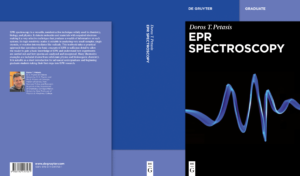
Professor of Physics Doros Petasis’ textbook EPR Spectroscopy was published on August 22 by De Gruyter (Berlin) academic publishers, part of De Gruyter’s Graduate Textbook Series. The book focuses on electron paramagnetic resonance (EPR), a spectroscopic technique used to study materials with unpaired electrons and finds wide applications in physics, chemistry, biology, and materials science. The book’s target audience is advanced undergraduate and beginning graduate students who are first learning about EPR.
During the writing of the book, two Allegheny alumni reviewed all chapters and provided valuable corrections and comments: Dr. Katlyn Meier (Allegheny physics, 2009) of the Department of Chemistry at the University of Miami and Dr. Bill Gunderson (Allegheny physics, 2002) of the Department of Chemistry at Hendrix College.
 Women in Physics Conference 2021
Women in Physics Conference 2021
Saturday, November 6, 2021
Contact Alexis Pleskovitch (pleskovitcha@allegheny.edu) with questions. Alexis is the President of SPS (Society of Physics Students).
Some of the planned events are a poster session to learn about research in STEM fields, a career panel, as well as a discussion about what it means to be a woman in Physics and how to navigate a field that is still male-dominated.
 2018, 2019, and 2020 Best for the Money in Pennsylvania
2018, 2019, and 2020 Best for the Money in Pennsylvania
Meadville, Pennsylvania – The accredited degree program in Physics at Allegheny College has been ranked as a “Best Value for the Money” in the annual nationwide ranking of U.S. colleges and universities by College Factual.
Allegheny’s physics curriculum offers academic possibilities as varied and individual as the students themselves. Choosing from a pure physics curriculum or one of several interdisciplinary emphases, students select courses to meet their own interests and goals. Graduates of the program have become doctors, engineers, lawyers, professors, software designers, and research scientists with placements including the Central Intelligence Agency and NASA. Physics students experience the camaraderie of a supportive department that offers opportunities for close collaboration with faculty in cutting-edge research.
The Program
Allegheny’s physics majors develop strong backgrounds in theoretical, experimental and computational physics, as well as a thorough understanding of the scientific method and an appreciation of the way the natural universe works. They are also encouraged to explore the impact of physics on the other sciences.
Double and student-designed majors are encouraged. Recently, double majors in physics/chemistry, physics/environmental science, and physics/mathematics have been especially popular. Student-designed programs may include emphases such as physics and biology, and physics and music.
The physics department also offers a physics minor and an astronomy minor.